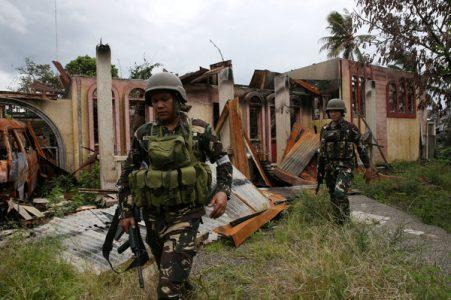
ISIS “headquarters” in Iraq and Syria helps fund militants in Philippines
The central command of the Islamic State in Syria has funneled tens of thousands of dollars to militants in the Philippines over the last year, most likely aiding their spectacular seizure of the southern Philippine city of Marawi, a report released Friday said.
The report from the Institute for Policy Analysis of Conflict, a research institute based in Jakarta, describes how Mahmud Ahmad, a high-level Islamic State figure from Malaysia, who is based near Marawi, worked through the group’s chain of command to Syria to get money and international recruits to help local militants seize territory in the Philippines for the caliphate.
The report provides insight into a question that has bewildered policy makers since militants affiliated with the Islamic State swept into Marawi two months ago: How were they able to seize an important city in the southern Philippines, and what if any role did the Islamic State’s central command play in the seizure?
The city has remained largely under the control of the militants for nearly two months despite a government military campaign to retake it with ground forces and aerial bombardments.
Underscoring the severity of the situation, President Rodrigo Duterte said that of the estimated 600 militants in Marawi, about 220 are still believed to be fighting, a sharply higher estimate than the military’s recent assertions that only around 60 were left there.
Continue reading the main story
Mr. Duterte gave the figure this week in urging the Philippine Congress to extend martial law through the end of the year, and he noted that the insurgents were still in control of central Marawi and that their leadership remained intact.
After the militants seized Marawi in late May, they raised the Islamic State flag and declared the establishment of a new province of the organization, also known as ISIS or ISIL. Some senior politicians in the Philippines have dismissed the Maute Group, the major Islamist militant group behind the seizure of Marawi, as “ISIS wannabes,” characterizing it as a drug mafia with little in common with the ideologically driven Islamic State fighters.
But the institute’s report suggests that Islamic State commanders in Syria took the Maute Group’s strategic ambitions seriously.
The Islamic State’s ability to financially support its Philippine offshoots appears limited mainly to periodic Western Union transfers of tens of thousands of dollars, the report found, suggesting that direct support from Syria was a relatively minor factor in the Maute Group’s ability to seize Marawi.
The report argues that local recruiting and fund-raising among pious Muslims who resented the Philippines’ central government have probably played a more significant role in the insurgents’ successes.
The institute’s research is based on field visits this year to Mindanao, the island where Marawi sits, interviews with people close to Indonesian militants in the Philippines, and militants’ messages obtained from Telegram, the highly encrypted messaging service used by the Islamic State. Last week the Indonesian government announced it would ban some features of Telegram, because of how useful the app has been for terrorists.
Intercepted chats show that the Islamic State has a sophisticated command structure in Southeast Asia, allowing for complex coordination among its supporters across the region.
In one instance from last year, two Indonesian militants were connected via a Malaysian contact to another militant based in Thailand who helped them support a prison break in that country. The goal was to free a group of Uighurs, members of a Muslim ethnic group from western China, who had been detained there.
Though the prison break was initially successful, the Uighurs were eventually recaptured by the Thai police. Still, the report notes, “The story illustrates how well-connected the ISIS network has become, with an Indonesian connecting as easily with contacts in Turkey, the Philippines and Thailand as with his own friends in prison.”
International coordination of Islamic State leaders with Southeast Asian militants may amplify the terrorism threat to neighboring Indonesia, the report said.
The last 18 months have produced a steady trickle of low-casualty Islamic State-inspired terrorist attacks in Indonesia, but until now the actions have tended to be poorly planned and executed. For example, two Indonesian suicide bombers struck in the Kampung Melayu neighborhood in East Jakarta in May, but only three victims were killed.
A major concern for the Indonesian government is that some of the 20-odd Indonesian fighters who have joined up with Islamic State groups in Mindanao will acquire the equipment and expertise to commit serious terrorist attacks at home.
The report calls for Indonesia, Malaysia and the Philippines to improve their security services’ coordination and intelligence sharing, so that the names of key suspects are passed along.
Still, the first step is ousting the Islamic State from Marawi.
When Marawi was seized in late May, Mr. Duterte pledged that the militants would be defeated quickly. But on Thursday he said that during recent operations to clear the city, the military recovered 75 million pesos, or $15 million, from one of the militants’ homes, a clear indication that they stocked up arms and money for the fight.
At least four villages, which make up the city’s commercial district and are home to roughly 800 structures, are in rebel hands, he added.
He also said the militants’ leadership “largely remains intact,” contrary to earlier military reports. Clashes continued into Friday as the military struggled to make advances.
The self-styled leader of Islamic State in the Philippines, Isnilon Hapilon, who leads the Abu Sayyaf insurgent group, is still at large, as are the brothers who lead the Maute group.
Source: NY Times





